November Primary Source for the History Classroom in November
Activities for the History Classroom
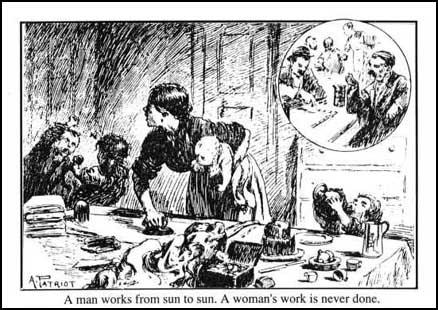
by the Women's Freedom League (February, 1911)
30th November, 2021: Annie Besant, The Law of Population (1878)
War, infanticide, hardship, famine, disease, murder of the aged, all these are among the positive checks which keep down the increase of population among savage tribes. War carries off the young men, full of vigour, the warriors in their prime of life, the strongest, the most robust, the most fiery - those in fact, who, from their physical strength and energy would be most likely to add largely to the number of the tribe. Infanticide, most prevalent where means of existence are most restricted, is largely practised among barbarous nations, the custom being due, to a large extent, to the difficulty of providing food for a large family.
Men, women, and children, who would be doomed to death in the savage state, have their lives prolonged by civilization; the sickly, whom the hardships of the savage struggle for existence would kill off, are carefully tended in hospitals, and saved by medical skill; the parents, whose thread of life would be cut short, are cherished on into prolonged old age; the feeble, who would be left to starve, are tenderly shielded from hardship, and life's road is made the smoother for the lame; the average life is lengthened, and more and more thought is brought to bear on the causes of preventable disease; better drainage, better homes, better food, better clothing, all these, among the more comfortable classes, remove many of the natural checks to population.
In England our population is growing rapidly enough to cause anxiety… England has almost doubled her population during the last fifty years. In 1810 the population of England and Wales was about 10,000,000, and in 1860 it was about 20,000,000. "At the present time" writes Professor Henry Fawcett, "it is growing at the rate of 200,000 every year, which is almost equivalent to the population of the country of Northampton… it is possible that the population of England will be 80 millions in 1960."
One of the earliest signs of too rapidly increasing population is the overcrowding of the poor. Just as the overcrowded seedlings spoil each other's growth, so do the overcrowded poor injure each other morally, mentally and physically. Whether we study town or country the result of our enquiries is the same - the houses are too small and the families are too large. Can there be any doubt that it is the large families so common among the English poor that is the root of this overcrowding? For not only would the "model-lodging house" have been less crowded if the parents, instead of having ten children, had only two, but with fewer children less money would be needed for food and clothing, and more could be spared for rent.
It is clearly useless to preach the limitation of the family and to conceal the means whereby such limitation may be effected. If the limitation be a duty it cannot be wrong to afford such information as shall enable people to discharge it… At present all one can do is to lay before the public the various checks suggested by doctors.
Question: Working class women were expected to work until they had children. These women tended to have more children than upper and middle class wives. In the middle of the 19th century, the average married woman gave birth to six children. Over 35% of all married women had eight or more children. The Church was totally opposed to the use of contraception to control family size. Several people, including Richard Carlile had been sent to prison for publishing books on the subject.
In 1877 Annie Besant and Charles Bradlaugh decided to publish The Fruits of Philosophy, written by Charles Knowlton, a book that advocated birth control. Besant and Bradlaugh were charged with publishing material that was "likely to deprave or corrupt those whose minds are open to immoral influences". Besant and Bradlaugh were both found guilty of publishing an "obscene libel" and sentenced to six months in prison. Explain the reasons why Besant thought that women should have access to information on birth control. It will help you to read this article on the History of Birth Control.
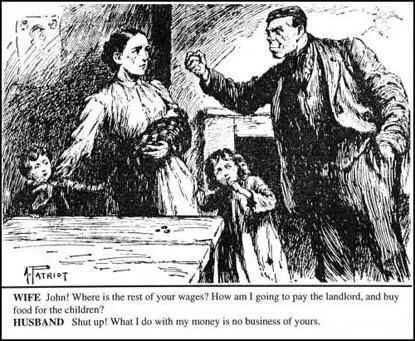
by the Women's Freedom League (February, 1911)
29th November, 2021: Caroline Norton, English Laws for Women in the Nineteenth Century (1854)
We had been married about two months, when, one evening, after we had all withdrawn to our apartments, we were discussing some opinion Mr. Norton had expressed; I said, that "I thought I had never heard so silly or ridiculous a conclusion." This remark was punished by a sudden and violent kick; the blow reached my side; it caused great pain for several days, and being afraid to remain with him, I sat up the whole night in another apartment.
Four or five months afterwards, when we were settled in London, we had returned home from a ball; I had then no personal dispute with Mr. Norton, but he indulged in bitter and coarse remarks respecting a young relative of mine, who, though married, continued to dance - a practice, Mr. Norton said, no husband ought to permit. I defended the lady spoken of when he suddenly sprang from the bed, seized me by the nape of the neck, and dashed me down on the floor. The sound of my fall woke my sister and brother-in-law, who slept in a room below, and they ran up to the door. Mr. Norton locked it, and stood over me, declaring no one should enter. I could not speak - I only moaned. My brother-in-law burst the door open and carried me downstairs. I had a swelling on my head for many days afterwards.
Question: Read the article about Caroline Norton and explain why she campaigned for the Marriage and Divorce Act (1857).
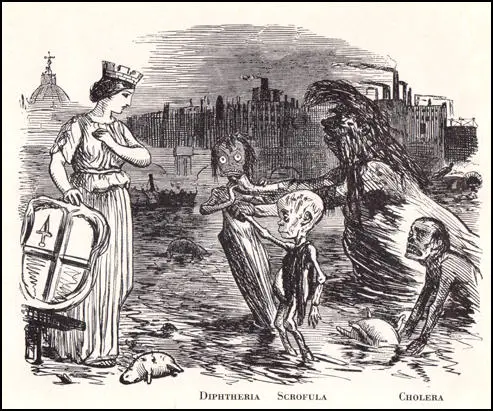
26th November, 2021: Henry Mayhew, Morning Chronicle (24th September 1849)
There is an Eastern fable which tells us that a certain city was infested by poisonous serpents that killed all they fastened upon; and the citizens, thinking them sent from Heaven as a scourge for their sins, kept praying that the visitation might be removed from them, until scarcely a house remained unsmitten. At length, however, concludes the parable, the eyes of the people were opened; for, after all their prayers and fastings, they found that the eggs of the poisonous serpents were hatched in the muck-heaps that surrounded their own dwellings.
The history of the late epidemic, which now seems to have almost spent its fatal fury upon us, has taught us that the masses of filth and corruption round the metropolis are, as it were, the nauseous nests of plague and pestilence. Indeed, so well known are the localities of fever and disease, that London would almost admit of being mapped out pathologically, and divided into its morbid districts and deadly cantons. We might lay our fingers on the Ordnance map, and say here is the typhoid parish, and there the ward of cholera; for as truly as the West-end rejoices in the title of Belgravia, might the southern shores of the Thames be christened Pestilentia. As season follows season, so does disease follow disease in the quarters that may be more literally than metaphorically styled the plague-spots of London. If the seasons are favourable, and typhus does not bring death to almost every door, then influenza and scarlatina fill the workhouses with the families of the sick. So certain and regular are the diseases in their returns, that each epidemic, as it comes back summer after summer, breaks out in the self-same streets as it appeared on its former visit, with but this slight difference, that if at its last visitation it began at the top of the Street, and killed its way down, this time it begins at the bottom, and kills its way as surely up the lines of houses.
Out of the 12,800 deaths which, within the last three months, have arisen from cholera, 6,500 have occurred on the southern shores of the Thames; and to this awful number no localities have contributed so largely as Lambeth, Southwark and Bermondsey, each, at the height of the disease, adding its hundred victims a week to the fearful catalogue of mortality. Any one who has ventured a visit to the last-named of these places in particular, will not wonder at the ravages of the pestilence in this malarious quarter, for it is bounded on the north and east by filth and fever, and on the south and west by want, squalor, rags and pestilence. Here stands, as it were, the very capital of cholera, the Jessore of London - JACOB'S ISLAND, a patch of ground insulated by the common sewer. Spared by the fire of London, the houses and comforts of the people in this loathsome place have scarcely known any improvement since that time. The place is a century behind even the low and squalid districts that surround it.
In the days of Henry II, the foul stagnant ditch that now makes an island of this pestilential spot, was a running stream, supplied with the waters which poured down from the hills about Sydenham and Nunhead, and was used for the working of the mills that then stood on its banks. These had been granted by charter to the monks of St. Mary and St. John, to grind their flour, and were dependencies upon the Priory of Bermondsey. Tradition tells us that what is now a straw yard skirting the river, was once the City Ranelagh, called "Cupid's Gardens," and that the trees, which are now black with mud, were the bowers under which the citizens loved, on the sultry summer evenings, to sit beside the stream drinking their sack and ale. But now the running brook is changed into a tidal sewer, in whose putrid filth staves are laid to season; and where the ancient summer-houses stood, nothing but hovels, sties, and muck-heaps are now to be seen.
Not far from the Tunnel there is a creek opening into the Thames. The entrance to this is screened by the tiers of colliers which lie before it. This creek bears the name of the Dock Head. Sometimes it is called St. Saviour's, or, in jocular allusion to the odour for which it is celebrated, Savory Dock. The walls of the warehouses on each side of this muddy stream are green and slimy, and barges lie beside them, above which sacks of corn are continually dangling from the cranes aloft. This creek was once supplied by the streams from the Surrey hills, but now nothing but the drains and refuse of the houses that have grown up round about it thickens and swells its waters.
On entering the precincts of the pest island, the air has literally the smell of a graveyard, and a feeling of nausea and heaviness comes over any one unaccustomed to imbibe the musty atmosphere. It is not only the nose, but the stomach, that tells how heavily the air is loaded with sulphuretted hydrogen; and as soon as you cross one of the crazy and rotting bridges over the reeking ditch, you know, as surely as if you had chemically tested it, by the black colour of what was once the white-lead paint upon the door-posts and window-sills, that the air is thickly charged with this deadly gas. The heavy bubbles which now and then rise up in the water show you whence at least a portion of the mephitic compound comes, while the open doorless privies that hang over the water side on one of the banks, and the dark streaks of filth down the walls where the drains from each house discharge themselves into the ditch on the opposite side, tell you how the pollution of the ditch is supplied.
The water is covered with a scum almost like a cobweb, and prismatic with grease. In it float large masses of green rotting weed, and against the posts of the bridges are swollen carcasses of dead animals, almost bursting with the gases of putrefaction. Along its shores are heaps of indescribable filth, the phosphoretted smell from which tells you of the rotting fish there, while the oyster shells are like pieces of slate from their coating of mud and filth. In some parts the fluid is almost as red as blood from the colouring matter that pours into it from the reeking leather-dressers' close by.
The striking peculiarity of Jacob's Island consists in the wooden galleries and sleeping-rooms at the back of the houses which overhang the dark flood, and are built upon piles, so that the place has positively the air of a Flemish street, flanking a sewer instead of a canal; while the little ricketty bridges that span the ditches and connect court with court, give it the appearance of the Venice of drains, where channels before and behind the houses do duty for the ocean. Across some parts of the stream whole rooms have been built, so that house adjoins house; and here, with the very stench of death rising through the boards, human beings sleep night after night, until the last sleep of all comes upon them years before its time. Scarce a house but yellow linen is hanging to dry over the balustrade of staves, or else run out on a long oar where the sulphur-coloured clothes hang over the waters, and you are almost wonderstruck to see their form and colour unreflected in the putrid ditch beneath.
At the back of nearly every house that boasts a square foot or two of outlet - and the majority have none at all - are pig-sties. In front waddle ducks, while cocks and hens scratch at the cinderheaps. Indeed the creatures that fatten on offal are the only living things that seem to flourish here.
The inhabitants themselves show in their faces the poisonous influence of the mephitic air they breathe. Either their skins are white, like parchment, telling of the impaired digestion, the languid circulation, and the coldness of the skin peculiar to persons suffering from chronic poisoning, or else their cheeks are flushed hectically, and their eyes are glassy, showing the wasting fever and general decline of the bodily functions. The brown, earthlike complexion of some, and their sunk eyes, with the dark areol~ round them, tell you that the sulphuretted hydrogen of the atmosphere in which they live has been absorbed into the blood; while others are remarkable for the watery eye exhibiting the increased secretion of tears so peculiar to those who are exposed to the exhalations of hydrosulphate of ammonia.
Scarcely a girl that has not suffusion and soreness of the eyes, so that you would almost fancy she had been swallowing small doses of arsenic; while it is evident from the irritation and discharge from the mucous membranes of the nose and eyes for which all the children are distinguished, that the poor emaciated things are suffering from continual inhalation of the vapour of carbonate of ammonia and other deleterious gases.
Nor was this to be wondered at, when the whole air reeked with the stench of rotting animal and vegetable matter: for the experiment of Professor Donovan has shown that a rabbit, with only its body enclosed in a bladder filled with sulphuretted hydrogen, and allowed to breathe freely, will die in ten minutes. Thénard also has proved that one eight hundredth part of this gas in the atmosphere is sufficient to destroy a dog, and one two hundred and fiftieth will kill a horse; while Mr. Taylor, in his book on poisons, assures us that the men who were engaged in excavating the Thames Tunnel suffered severely during the work from the presence of this gas in the atmosphere in which they were obliged to labour. "The air, as well as the water which trickled through the roof," he tells us, "was found to contain sulphuretted hydrogen. This was probably derived from the action of the iron pyrites in the clay. By respiring this atmosphere the strongest and most robust men were, in the course of a few months, reduced to a state of extreme exhaustion and died. They became emaciated, and fell into a state of low fever, accompanied with delirium. In one case which I saw," he adds, "the face of the man was pale, the lips of a violet hue, the eyes sunk and dark all round, and the whole muscular system flabby and emaciated." To give the reader some idea as to the extent with which the air in Jacob's Island is charged with this most deadly compound, it will be sufficient to say that a silver spoon of which we caught sight in one of the least wretched dwellings was positively chocolate-coloured by the action of the sulphur on the metal.
On approaching the tidal ditch from the Neckinger-road, the shutters of the house at the corner were shut from top to bottom. Our intelligent and obliging guide, Dr. Martin, informed us that a girl was then lying dead there from cholera, and that but very recently another victim had fallen in the house adjoining it. This was the beginning of the tale of death, for the tidal ditch was filled up to this very point. Here, however, its putrefying waters were left to mingle their poison with the 267 cubic feet of air that each man daily takes into his lungs, and this was the point whence the pestilence commenced its ravages. As we walked down George-row, our informant told us that at the corner of London-street he could see, a short time hack, as many as nine houses in which there were one or two persons lying dead of the cholera at the same time; and yet there could not have been more than a dozen tenements visible from the spot.
We crossed the bridge, and spoke to one of the inmates. In answer to our questions, she told us she was never well. Indeed, the signs of the deadly influence of the place were painted in the earthy complexion of the poor woman. "Neither I nor my children know what health is," said she. "But what is one to do? We must live where our bread is. I've tried to let the house, and put a bill up, but cannot get any one to take it. From this spot we were led to narrow close courts, where the sun never shone, and the air seemed almost as stagnant and putrid as the ditch we had left. The blanched cheeks of the people that now came out to stare at us, were white as vegetables grown in the dark, and as we stopped to look down the alley, our informant told us that the place teemed with children, and that if a horn was blown they would swarm like bees at the sound of a gong. The houses were mostly inhabited by "corn-runners," coal-porters, and "longshore-men," getting a precarious living - earning some times as much as 12s. a day, and then for weeks doing nothing. Fevers prevailed in these courts we were told more than at the side of the ditch.
By this way we reached a dismal stack of hovels called, by a strange incongruity, Pleasant-row. Inquiring of one of the inmates, we were informed that they were quite comfortable now! The stench had been all removed, said the woman, and we were invited to pass to the back-yard as evidence of the fact. We did so; the boards bent under our feet, and the air in the cellar-like yard was foetid to positive nausea. As we left the house a child sat nursing a dying half-comatose baby on a door step. The skin of its little arms, instead of being plumped out with health, was loose and shrivelled, like an old crone's, and had a flabby monkey-like appearance more than the character of human cuticle. The almost jaundiced colour of the child's skin, its half paralyzed limbs, and state of stupor, told it was suffering from some slow poison; indeed the symptoms might readily have been mistaken for those of chronic poisoning from acetate of lead. At the end of this row our friend informed us that the last house on either side was never free from fever.
Continuing our course we reached "The Folly," another street so narrow that the names and trades of the shopmen were painted on boards that stretched, across the street, from the roof of their own house to that of their neighbour's. We were here stopped by our companion in front of a house "to let." The building was as narrow and as unlike a human habitation as the wooden houses in a child's box of toys. "In this house," said our friend, "when the scarlet fever was raging in the neighbourhood, the barber who was living here suffered fearfully from it; and no sooner did the man get well of this than he was seized with typhus, and scarcely had he recovered from the first attack than he was struck down a second time with the same terrible disease. Since then he has lost his child with cholera, and at this moment his wife is in the workhouse suffering from the same affliction. The only wonder is that they are not all dead, for as the man sat at his meals in his small shop, if he put his hand against the wall behind him, it would be covered with the soil of his neighbour's privy, sopping through the wall. At the back of the house was an open sewer, and the privies were full to the seat."
One fact, says an eminent writer in toxicology, is worthy of the attention of medical jurists, namely, that the respiration of an atmosphere only slightly impregnated with the gases emanating from drains and sewers, may, if long continued, seriously affect an individual and cause death. M. D'Arcet had to examine a lodging in Paris, in which three young and vigorous men had died successively in the course of a few years, under similar symptoms. The lodging consisted of a bed-room with a chimney, and an ill-ventilated ante-room. The pipe of a privy passed down one side of the room, by the head of the bed, and the wall in this part was damp from infiltration. At the time of the examination there was no perceptible smell in the room, though it was small and low.
We then journeyed on to London-street, down which the tidal ditch continues its course. In No. 1 of this street the cholera first appeared seventeen years ago, and spread up it with fearful virulence; but this year it appeared at the opposite end, and ran down it with like severity. As we passed along the reeking banks of the sewer the sun shone upon a narrow slip of the water. In the bright light it appeared the colour of strong green tea, and positively looked as solid as black marble in the shadow - indeed it was more like watery mud than muddy water; and yet we were assured this was the only water the wretched inhabitants had to drink. As we gazed in horror at it, we saw drains and sewers emptying their filthy contents into it; we saw a whole tier of doorless privies in the open road, common to men and women, built over it; we heard bucket after bucket of filth splash into it, and the limbs of the vagrant boys bathing in it seemed, by pure force of contrast, white as Parian marble. And yet, as we stood doubting the fearful statement, we saw a little child, from one of the galleries opposite, lower a tin can with a rope to fill a large bucket that stood beside her. In each of the balconies that hung over the stream the self-same tub was to be seen in which the inhabitants put the mucky liquid to stand, so that they may, after it has rested for a day or two, skim the fluid from the solid particles of filth, pollution, and disease. As the little thing dangled her tin cup as gently as possible into the stream, a bucket of night-soil was poured down from the next gallery.
In this wretched place we were taken to a house where an infant lay dead of the cholera. We asked if they really did drink the water? The answer was, "They were obliged to drink the ditch, without they could beg a pailfull or thieve a pailfull of water. But have you spoken to your landlord about having it laid on for you? "Yes, sir; and he says he'll do it, and do it, but we know him better than to believe him." "Why, sir," cried another woman, who had shot out from an adjoining room, "he won't even give us a little whitewash, though we tell him we'll willingly do the work ourselves: and look here, sir," she added, "all the tiles have fallen off, and the rain pours in wholesale."
We had scarcely left the house when a bill caught our eye, announcing that "this valuable estate" was to be sold!
From this spot we crossed the little shaky bridge into Providence-buildings - a narrow neck of land set in sewers. Here, in front of the houses, were small gardens that a table-cloth would have covered. Still the one dahlia that here raised its round red head made it a happier and brighter place. Never was colour so grateful to the eye. All we had looked at had been so black and dingy, and had smelt so much of churchyard clay, that this little patch of beauty was brighter and greener than ever was oasis in the desert. Here a herd of children came out, and stared at us like sheep. One child our guide singled out from the rest. She had the complexion of tawed leather, and her bright, glassy eyes were sunk so far back in her head, that they looked more like lights shining through the hollow sockets of a skull than a living head, and her bones seemed ready to start through the thin layer of skin. We were told she had had the cholera twice. Her father was dead of it. "But she, sir," said a woman addressing us, "won't die. Ah! if she'd had plenty of victuals and been brought up less hardy she would have been dead and buried long ago, like many more. And here's another," she added, pushing forward a long thin woman in rusty black. "Why' I've know'd her eat as much as a quartern loaf at a meal. and you can't fatten her no how." Upon this there was a laugh. but in the woman's bloodless cheeks and blue lips we saw that she like the rest was wasting away from the influence of the charnel-like atmosphere around her.
The last place we went to was in Joiner's-court, with four wooden houses in it, in which there had lately been as many as five cases of cholera. In front, the poor souls, as if knowing by an instinct that plants were given to purify the atmosphere, had pulled up the paving-stones before their dwellings, and planted a few stocks here and there in the rich black mould beneath. The first house we went to, a wild ragged-headed boy shot out in answer to our knock, and putting his hands across the doorway, stood there to prevent our entrance. Our friend asked whether he could enter, and see the state of the drainage? "No; t'ain't convenient," was the answer, given so quickly and sharply, that the lad forced some ugly and uncharitable suspicion upon us. In the next house, the poor inmate was too glad to meet with any one ready to sympathise with her sufferings. We were taken up into a room, where we were told she had positively lived for nine years. The window was within four feet of a high wall, at the foot of which, until very recently, ran the open common sewer. The room was so dark that it was several minutes before we could see anything within it, and there was a smell of must and dry rot that told of damp and imperfect ventilation, and the unnatural size of the pupils of the wretched woman's eyes convinced us how much too long she had dwelt in this gloomy place.
Here, as usual, we heard stories that made one's blood curdle. of the cruelty of those from whom they rented the sties called dwellings. They had begged for pure water to be laid on, and the rain to be shut out; and the answer for eighteen years had been, that the lease was just out. "They knows its handy for a man's work," said one and all, "and that's the reason why they impose on a body." This, indeed, seems to us to be the great evil. Out of these wretches' health, comfort, and even lives, small capitalists reap a petty independence; and until the poor are rescued from the fangs of these mercenary men, there is but little hope either for their physical or moral welfare.
The extreme lassitude and deficient energy of both body and mind induced by the mephitic vapours they continually inhale leads them - we may say, forces them to seek an unnatural stimulus in the gin-shop; indeed, the publicans of Jacob's Island drive even a more profitable trade than the landlords themselves. What wonder, then, since debility is one of the predisposing conditions of cholera, that - even if these stenches of the foul tidal ditch be not the direct cause of the disease - that the impaired digestive functions, the languid circulation, the depression of mind produced by the continued inhalation of the noxious gases of the tidal ditch, together with the intemperance that it induces - the cold, damp houses - and, above all, the quenching of the thirst and cooking of the food with water saturated with the very excrements of their fellow creatures, should make Jacob's Island notorious as the Jessore of England.
Question: The summer of 1849 saw a serious outbreak of cholera in England. Within three months, an estimated 13,000 people in London died from the disease. On 24th September, Henry Mayhew wrote an article on the impact of cholera on the working-class district of Bermondsey. After reading his article what suggestions would you make that might reduce the number of people dying of cholera.
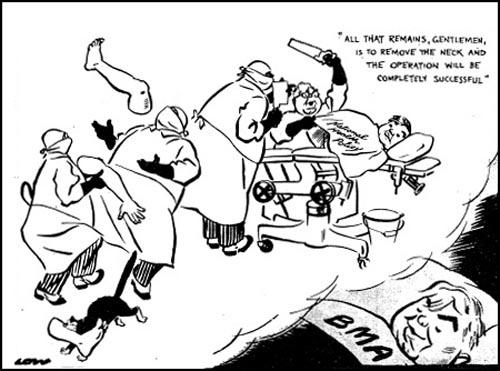
25th November, 2021: Aneurin Bevan, speech at a Labour Party meeting in Manchester (4th July, 1945)
No amount of cajolery, and no attempts at ethical or social seduction, can eradicate from my heart a deep burning hatred for the Tory Party that inflicted those bitter experiences on me. So far as I am concerned they are lower than vermin. They condemned millions of first-class people to semi-starvation. Now the Tories are pouring out money in propaganda of all sorts and are hoping by this organised sustained mass suggestion to eradicate from our minds all memory of what we went through. But, I warn you young men and women, do not listen to what they are saying now. Do not listen to the seductions of Lord Woolton. He is a very good salesman. If you are selling shoddy stuff you have to be a good salesman. But I warn you they have not changed, or if they have they are slightly worse than they were.
Human beings are complex creatures, and most generalisations about them give little light... I don't think a Tory, considered as a person, is any worse or better than anyone else. The private morals of many of our leading Tories are beyond reproach, whereas their public morals are execrable. In their personal circle they would hesitate to tell lies, yet in public, deception is accepted as part of their technique of government.
Question: Aneurin Bevan made this speech in response to the attempts by the Conservative Party to stop the introduction of the National Health Service. Read the page on Aneurin Bevan and explain what he meant when he said: "no attempts at ethical or social seduction, can eradicate from my heart a deep burning hatred for the Tory Party that inflicted those bitter experiences on me".

24th November, 2021: Matthew Paris, Greater Chronicle (c. 1260)
John was a tyrant rather than a king, a destroyer rather than a governor, an oppressor of his own people, and a friend to strangers, a lion to his own subjects, a lamb to foreigners and those who fought against him; for, owing to his slothfulness, he had lost Normandy and, moreover, was eager to lose the kingdom of England or destroy it; he was an insatiable extorter of money, and an invader and destroyer of the possessions of his own natural subjects... he had violated the daughters and sisters of his nobles; and was wavering and distrustful in his observance of the Christian religion?
(After signing the Magna Carta) King John's mental state underwent a great change... He started to gnash his teeth and roll his eyes in fury. Then he would pick up sticks and straws and gnaw them like a lunatic... His uncontrolled gestures gave indications... of the madness that was upon him.
Question: Read about Matthew Paris. Is he a reliable source on King John?
For other questions on this subject see: Medieval and Modern Historians on King John (Answer Commentary)
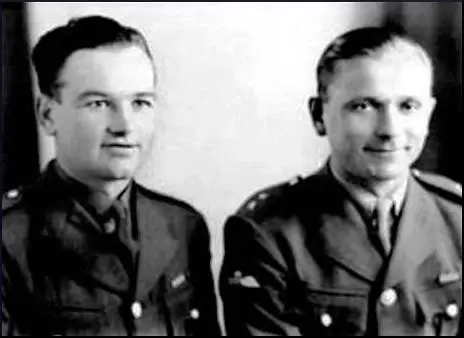
23rd November, 2021: Alexander Dubček, Hope Dies Last (1992)
The need for a spectacular act of anti-Nazi defiance in the so-called Protectorate helped inspire the assassination of Reinhard Heydrich in May 1942. Heydrich was the head of the Sicherheitsdienst, or SD, the Nazi secret service, and was sent by Hitler to Prague in early 1942 as the ranking German officer in the occupied Czech lands.
Beneš and his chief of army intelligence in London, General Moravec, chose two noncommissioned officers of the Czechoslovak Army in England to parachute into the Protectorate and execute Heydrich. It was no coincidence that one of them - Jozef Gabčík - was Slovak, and the other, Jan Kubis, Czech. This pairing was meant to symbolize the continuing mutuality of Czech and Slovak national interests.
Question: Why did Alexander Dubček support the operation to assassinate Reinhard Heydrich? Why was it important to carefully select the two men for the operation?
For other questions on this subject see: The Assassination of Reinhard Heydrich (Answer Commentary)
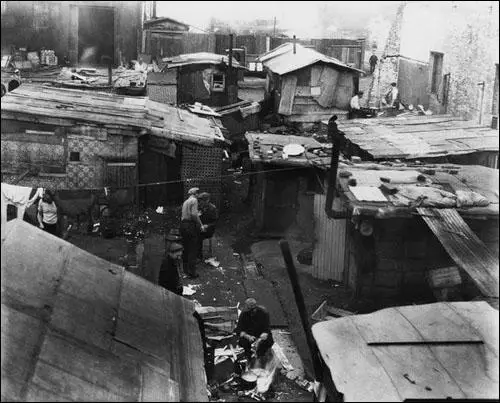
22nd November, 2021: Louis Banks, McGehee, Arkansas, interview, Studs Terkel, Hard Times: An Oral History of the Great Depression (1970)
A man had to be on the road. Had to leave his wife, had to leave his mother, leave his family just to try to get money to live on. But ... my dear mother, tryin' to send her money, worryin' how she's starvin. The shame I was feeling. I walked out because I didn't have a job. I said, "I'm going out in the world and get me a job". And God help me, I couldn't get anything. I wouldn't let them see me dirty and ragged and I hadn't shaved. I wouldn't send 'em no picture.
I'd write: "Dear Mother, I'm doin' wonderful and wish you're all fine". That was in Los Angeles and I was sleeping under some steps and there was some paper over me. This is the slum part, Negroes lived down there. And my ma, she'd say, "Oh, my son is in Los Angeles, he's doin' pretty fair".
Question: What does this source tell us about the effect that the depression had on family life in America?
For other questions on this subject see: The Great Depression (Answer Commentary)
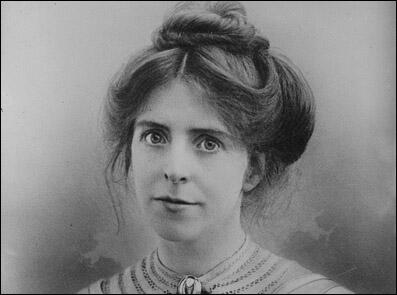
19th November, 2021: Annie Kenney, Memories of a Militant (1924)
The Oldham Trades Council invited Christabel Pankhurst and Teresa Billington to speak on Women's Suffrage. I had never heard of "Votes for Women". Politics did not interest me in the least. Miss Pankhurst was more hesitating, more nervous than Miss Billington. She impressed me, though. She was more impersonal and full of zeal. Miss Billington used a sledge-hammer of logic and cold reason… When the meeting was over I drifted towards Miss Pankhurst. Before I knew what I done I had promised to organize a meeting for Miss Pankhurst among factory-women of Oldham....
The changed life into which most of us entered was a revolution in itself. No home life, no one to say what we should do or what we should not do, no family ties, we were free and alone in a great brilliant city, scores of young women scarcely out of their teens met together in a revolutionary movement, outlaws or breakers of laws, independent of everything and everybody, fearless and self-confident...
It was an unwritten rule that there should be no concerts, no theatres, no smoking; work, and sleep to prepare us for more work, was the unwritten order of the day...
In 1909 Wallace Dunlop went to prison and defied the long sentences that were being given by adopting the hunger-strike. 'Release or Death' was her motto. From that day, July 5th, 1909, the hunger-strike was the greatest weapon we possessed against the Government… before long all Suffragette prisoners were on hunger-strike, so the threat to pass long sentences on us had failed. Sentences grew shorter...
I had as my visitors the matron, the Governor, the doctor, the clergyman, and the visiting magistrate. They all asked me to eat and drink, but nothing would tempt me. The matron, the doctor and I became good friends. The doctor was ever so kind and did his best to persuade me to have fruit, but fruit was no use to me. "I must be out in three days, doctor, or I'll die on your hands!" And the good doctor did not want a death. In three days the gates were opened… Mrs. Brackenbury lent us her house at 2 Camden Hill Square. We called it Mouse Castle. All the mice went there from prison and were nursed back to health and prepared for further danger work… When I recovered I was re-arrested.
Question: (a) How did Annie Kenney become involved in politics? (b) Why did the Women's Social and Political Union (WSPU) have an "unwritten rule that there should be no concerts, no theatres, no smoking"? (3) Why did the government introduce the Cat and Mouse Act?
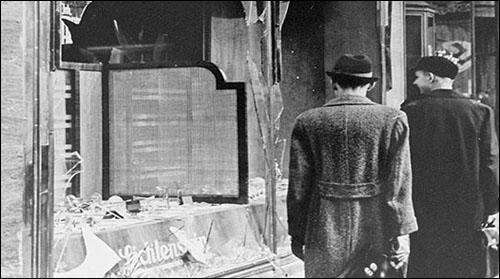
18th November, 2021: Susanne von der Borch was fifteen years old in 1938. She was interviewed by Cate Haste, for her book, Nazi Women (2001)
My mother was at the window. I sat up and saw the house opposite in flames. I heard someone screaming, "Help! Why doesn't anyone help us?" and I asked my mother, "Why is the house burning, where are the fire brigades, why are the people screaming?" And she just said, "Stay in bed."
And she left the house with my older sister. I woke up my younger brother who was two years younger. And we sat on the stairs and waited for a long time. It was very ghostly, because we heard these screams and saw the flames.
After a longtime, my mother came back. She had fifteen people with her. I was shocked because they were in nightgowns and slippers, or just a light coat. And I could see they were all our Jewish neighbours. She took them into the music room and my brother and I were told, "Be quiet and don't move."
My mother was very strict, so we didn't move. And we heard our mother phoning people up, and my sister was sent here and there to get drinks for them. Then these people were driven away by our chauffeur to relatives or friends.
And my mother told us afterwards that one of her neighbours, Frau Bach, was standing in front of her house without shoes in her nightgown, and my mother had a pile of coats and shoes and things, but Frau Bach said to her, "Well, at least I have my husband." And at that moment a car arrived with the SA, and they took Herr Bach into the car and he was driven to Dachau. But he was freed after a few weeks. He came back and they escaped to England, then America.
It was a shocking experience for me, and it did make me think more about the whole movement...
At a meeting the following day... a few of the Hitler Youth leaders were there, who I normally liked a lot. And they were standing there telling us how they had spent the night. They said they had been at a shop, the Eichengrun in Munich, and they'd smashed the windows, and they'd got hold of one Jew and shaved the hair on his head. And I said, "You horrible pigs!" And I thought, I have to find out the truth, what was really going on. And that was when I really started to ask serious questions.
Question: Susanne von der Borch was only 15 years old when Kristallnacht (Crystal Night) took place. Read an account of her life and explain why she became a opponent of Adolf Hitler.
For other questions on this subject see: Kristallnacht (Answer Commentary)
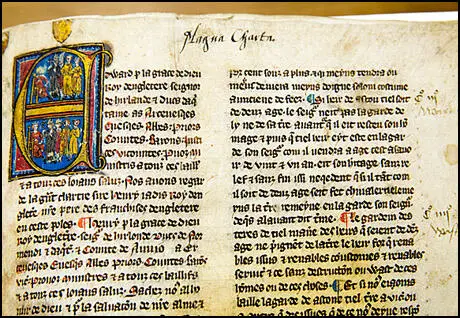
17th November, 2021: Extracts from the Magna Carta (1215)
(I) In the first place we have granted to God... that the English Church shall be free... freedom of elections, which is reckoned most important and very essential to the English Church...
(II) If any of our earls, or barons... shall have died, and at the time of his death his heir shall be of full age... he shall have his inheritance...
(VII) A widow, after the death of her husband, shall without difficulty have her inheritance...
(VIII) No widow shall be compelled to marry, so long as she prefers to live without a husband...
(XI) If anyone die indebted to the Jews, his wife shall... pay nothing of that debt.
(XII) No scutage or aid (tax) shall be imposed on our kingdom, unless by common counsel of our kingdom...
(XIV) And for obtaining the common counsel of the kingdom before the assessing of an aid or of a scutage, we will cause to be summoned the archbishops, bishops, abbots, earls, and greater barons...
(XX) A freeman shall not be fined for a slight offence... and for a grave offence he shall be fined in accordance with the gravity of the offence... and a villein should be fined in the same way.
(XXIII) No village or individual shall be compelled to make bridges or river banks...
(XXX) No sheriff or bailiff... or other person, shall take the horses or carts of any freeman for transport duty, against the will of the said freeman...
(XXXV) Let there be one measure of wine throughout the whole kingdom, and one measure of ale; and one measure of corn; and one width of cloth...
(XXXIX) No freeman shall be taken or imprisoned or outlawed or exiled or in anyway destroyed... except by the lawful judgement of his peers or by the law of the land.
(XL) To no one will we sell, to no one will we refuse justice.
(XLI) All merchants shall have safe and secure exit from England, and entry to England, with right to be there and to move about... for buying and selling... except in time of war, such merchants as are of the land at war with us. And if they are found in our land at the beginning of the war, they shall be detained, without injury to their bodies or goods, until information be received by us by our chief justicar how the merchants of our land found in the land at war with us are treated; and if our men are safe there the others shall be safe in our land.
(XLII) It shall be lawful in future for anyone to leave our kingdom... excepting those imprisoned or outlawed in accordance with the law in the kingdom...
(XLV) We will appoint as justices, constables, sheriffs, or bailiffs only such as know the law of the kingdom and mean to observe it well.
Question: What evidence is there in the Magna Carta that the barons were unhappy with the way the law operated under King John? Explain how the following groups of people might have responded to the Magna Carta: (a) widows; (b) merchants; (c) villeins.
For other questions on this subject see: King John and the Magna Carta (Answer Commentary)
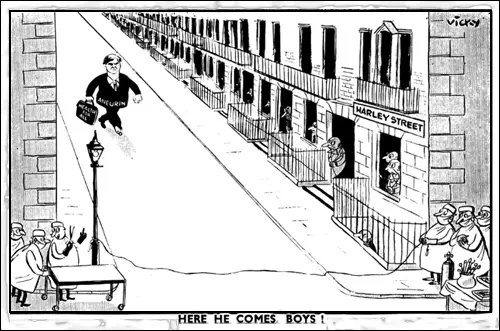
16th November, 2021: The Daily Sketch (7th February, 1948)
The State medical service is part of the Socialist plot to convert Great Britain into a National Socialist economy. The doctors' stand is the first effective revolt of the professional classes against Socialist tyranny. There is nothing that Bevan or any other Socialist can do about it in the shape of Hitlerian coercion.
Question: The Conservative Party and most British newspapers opposed the introduction of the National Health Service. What methods does the The Daily Sketch use to persuade its readers that the NHS is a bad idea?
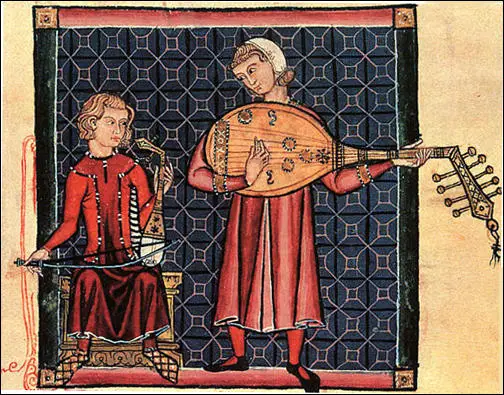
15th November, 2021: John Major, The History of Greater Britain (1521)
At this time (the reign of Richard the Lionheart) there flourished the most famous robbers Robin Hood and Little John, who lay in wait in the woods, and robbed those that were wealthy... The feats of Robin are told in song all over Britain. He would allow no woman to suffer injustice, nor would he rob the poor, but rather enriched them from the plunder taken from abbots.
Question: According to one historian: "Wandering minstrels) were the journalists of their day, keeping the people informed of ideas and events from beyond the borders of their limited acres... They traded in pleasure, in hard news and gossip, in the latest fashions, in poetry, song and dance - they were the voice of change." Why did Edward IV pass this law in 1469: "No minstrel of our kingdom, although he may be sufficiently learned in his art or occupation, shall in any way exercise this art or occupation within our kingdom henceforth unless he be a member of the guild."
For other questions on this subject see: Wandering Minstrels in the Middle Ages (Answer Commentary)
17th November, 2021: The Daily Sketch (7th February, 1948)
The State medical service is part of the Socialist plot to convert Great Britain into a National Socialist economy. The doctors' stand is the first effective revolt of the professional classes against Socialist tyranny. There is nothing that Bevan or any other Socialist can do about it in the shape of Hitlerian coercion.
Question: The Conservative Party and most British newspapers opposed the introduction of the National Health Service. What methods does the The Daily Sketch use to persuade its readers that the NHS is a bad idea?
For other questions on this subject see: Wandering Minstrels in the Middle Ages (Answer Commentary)
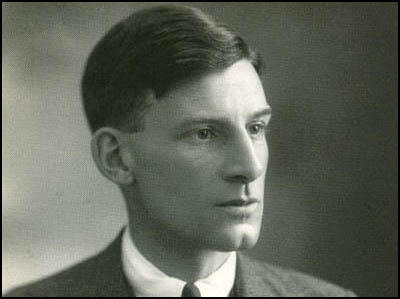
12th November, 2021: Siegfried Sassoon, Suicide in the Trenches (1917)
I knew a simple soldier boy
Who grinned at life in empty joy,
Slept soundly through the lonesome dark,
And whistled early with the lark.
In winter trenches, cowed and glum,
With crumps and lice and lack of rum,
He put a bullet through his brain.
No one spoke of him again.
You smug-faced crowds with kindling eye
Who cheer when soldier lads march by,
Sneak home and pray you'll never know
The hell where youth and laughter go.
Question: How useful is a poem written by Siegfried Sassoon for a historian writing about trench life on the Western Front?
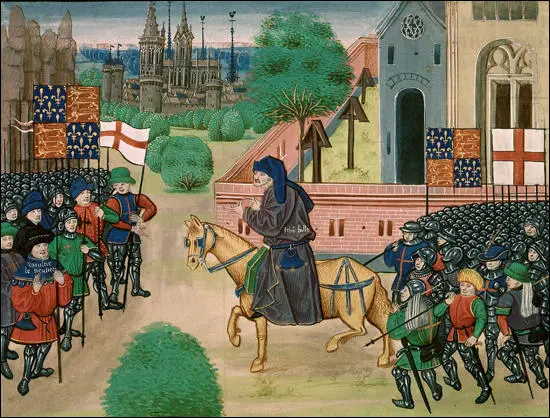
John Ball at Mile End from Jean Froissart, Chronicles (c. 1470)
11th November, 2021: John Ball, quoted by Jean Froissart, Chronicles (c. 1395)
Why are those whom we call lords, masters over us? How have they deserved it? By what right do they keep us enslaved? We are all descended from our first parents, Adam and Eve; how then can they say that they are better than us... At the beginning we were all created equal. If God willed that there should be serfs, he would have said so at the beginning of the world. We are formed in Christ's likeness, and they treat us like animals... They are dressed in velvet and furs, while we wear only cloth. They have wine, and spices and good bread, while we have rye bread and water. They have fine houses and manors, and we have to brave the wind and rain as we toil in the fields. It is by the sweat of our brows that they maintain their high state. We are called serfs, and we are beaten if we do not perform our task... Let us go to see King Richard. He is young, and we will show him our miserable slavery, we will tell him it must be changed, or else we will provide the remedy ourselves. When the King sees us, either he will listen to us, or we will help ourselves. When we are ready to march on London I will send you a secret message. The message is "Now is the time. Stand together in God's name".
Question: Explain the views held by John Ball. Did John Ball want rapid or gradual change? Did he want these changes to be local or national?
For other questions on this subject see: Medieval Historians and John Ball (Answer Commentary)
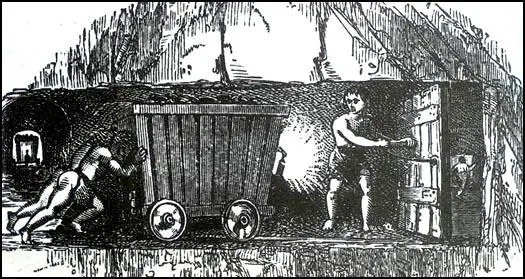
10th November, 2021: Sarah Gooder, aged eight, was interviewed by the Children's Employment Commission Report in 1842.
I'm a trapper in the Gawber pit. It does not tire me, but I have to trap without a light and I'm scared. I go at four and sometimes half past three in the morning, and come out at five and half past. I never go to sleep. Sometimes I sing when I've light, but not in the dark; I dare not sing then. I don't like being in the pit. I am very sleepy when I go sometimes in the morning. I go to Sunday-schools and read Reading made Easy.... They teach me to pray... I have heard tell of Jesus many a time. I don't know why he came on earth, I'm sure, and I don't know why he died, but he had stones for his head to rest on. I would like to be at school far better than in the pit.
Question: Why did most children dislike working in the collieries? Why did the colliery owners like employing children?
For other questions on this subject see: Child Labour in the Collieries (Answer Commentary)
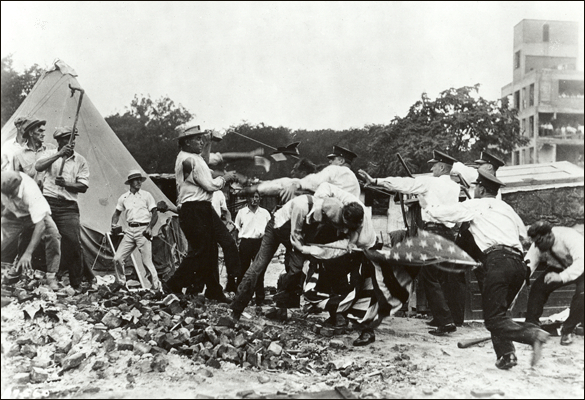
9th November, 2021: Time Magazine (8th August, 1932)
When war came in 1917 William Hushka, 22-year-old Lithuanian, sold his St. Louis butcher shop, gave the proceeds to his wife, joined the Army. He was sent to Camp Funston, Kansas where he was naturalized. Honorably discharged in 1919, he drifted to Chicago, worked as a butcher, seemed unable to hold a steady job. His wife divorced him, kept his small daughter.
Long jobless, in June he joined a band of veterans marching to Washington to fuse with the Bonus Expeditionary Force. "I might as well starve there as here", he told his brother. He took part in the demonstration at the Capital the day Congress adjourned without voting immediate cashing of the bonus.
Last week William Hushka's Bonus for $528 suddenly became payable in full when a police bullet drilled him dead in the worst public disorder the capital has known in years.
Question: How does the author of the article in Time Magazine encourage the reader to feel sorry for William Hushka?
For other questions on this subject see: The Bonus Marchers (Answer Commentary)

8th November, 2021: Poem by Martin Niemöller that was said to have been written in 1946.
First they came for the communists, and I did not speak out - because I was not a communist;
Then they came for the socialists, and I did not speak out - because I was not a socialist;
Then they came for the trade unionists, and I did not speak out - because I was not a trade unionist;
Then they came for the Jews, and I did not speak out - because I was not a Jew;
Then they came for me - and there was no one left to speak out for me.
Question: Read the page on Martin Niemöller and then explain the meaning of the poem.
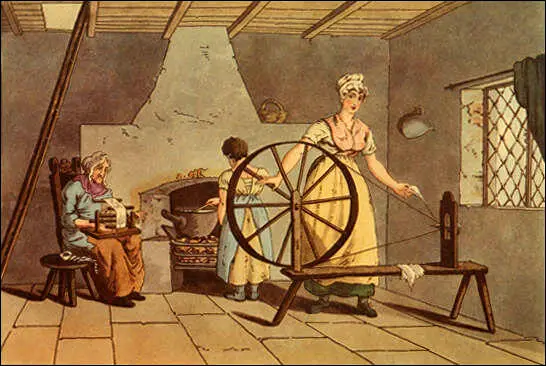
5th November, 2021: Daniel Defoe, A Tour Through the Whole Island of Great Britain (1724)
The nearer we came to Halifax, we found the houses thicker, and the villages greater. The sides of hills, which were very steep, were spread with houses; for the land being divided into small enclosures, that is to say, from two acres to six or seven acres each, seldom more; every three or four pieces of land had a house belonging to it.
Their business is the clothing trade. Each clothier must keep a horse, perhaps two, to fetch and carry for the use of his manufacture, to fetch home his wool and his provisions from the market, to carry his yarn to the spinners, his manufacture to the fulling mill, and, when finished, to the market to be sold.
Among the manufacturers' houses are likewise scattered an infinite number of cottages or small dwellings, in which dwell the workmen which are employed, the women and children of whom, are always busy carding, spinning, etc. so that no hands being unemployed all can gain their bread, even from the youngest to the ancient; anyone above four years old works.
Question: Describe how the domestic system worked. Why was the domestic system popular with the British people?
For other questions on this subject see: The Domestic System (Answer Commentary)
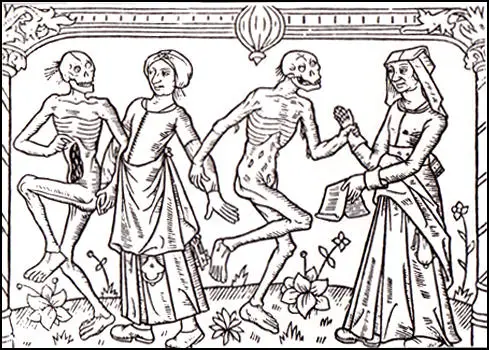
4th November, 2021: Law passed by King Richard II in 1388
So much dung and filth... as well as dead beasts... are in the ditches, rivers and other waters... the air is greatly corrupt... Many intolerable diseases do daily happen... to the great annoyance, damage and peril of the inhabitants, dwellers, repairers and travellers... All dung, garbage, entrails and other odour in ditches, rivers, waters... shall be removed and carried away... upon pain to lose and forfeit to our Lord the King £20.
Question: Does this law suggest that King Richard II understood the reasons why so many people died of disease in the 14th century.
For other questions on this subject see: Disease in the 14th Century (Answer Commentary)
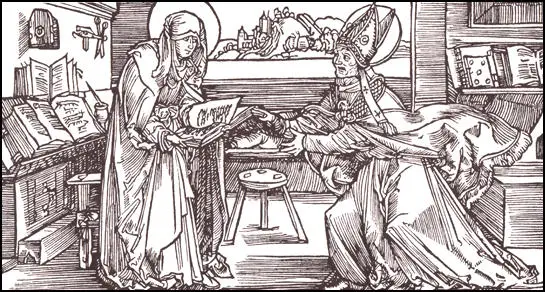
3rd November, 2021: Christine de Pizan, City of Ladies (1405)
I am amazed by the opinion of some men who claim that they do not want their daughters or wives to be educated because they would be ruined as a result... Not all men (and especially the wisest) share the opinion that it is bad for women to be educated. But it is very true that many foolish men have claimed this because it upset them that women knew more than they did.
Question: In the Middle Ages there was an increase in the percentage of women who could read and write. Give as many reasons as you can for this.
For other questions on this subject see: The Growth of Female Literacy in the Middle Ages (Answer Commentary)
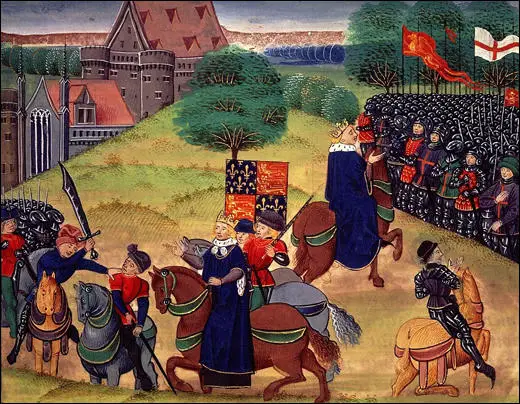
The death of Wat Tyler from Jean Froissart, Chronicles (c. 1470)
2nd November, 2021: Henry Knighton, Chronicles (c. 1390)
Tyler stayed close to the king and spoke on behalf of the other rebels. He had drawn his knife, commonly called a dagger, and kept throwing it from hand to hand like a boy playing a game. It was believed that he would take the opportunity to stab the king suddenly if the latter refused what he demanded; those who stood near the king certainly feared what would happen. The rebels asked the king that all water, parks and woods should be made common to all: so that throughout the kingdom the poor as well as the rich should be free to take game in water, fish ponds, woods and forests... When the king paused to consider these demands, Wat Tyler approached the king and spoke threateningly to him. When John de Walworth, mayor of London, noticed this, he feared the king was about to be killed and knocked Wat Tyler into the gutter with his sword. Thereupon another squire called Ralph Standish pierced his side with another sword... When Tyler was dead, he was dragged by his hands and feet like a vile thing into the nearby church of St Bartholomew.
Question: Why did Henry Knighton believe Wat Tyler was killed? What other reasons did the king's men have for killing Wat Tyler? Select the reason that you think is the most important.
For other questions on this subject see: Death of Wat Tyler (Answer Commentary)
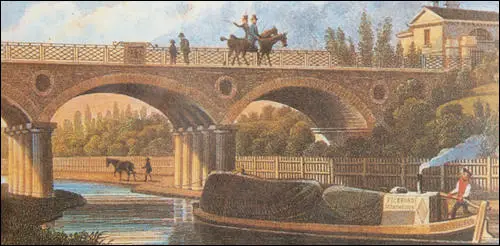
1st November, 2021: Samuel Smiles, James Brindley and the Early Engineers (1864)
The Duke of Bridgewater, more than any other single man, contributed to lay the foundations of the prosperity of Manchester and Liverpool. The cutting of the canal from Worsley to Manchester gave that town the immediate benefit of a cheap and abundant supply of coal; and when Watt's steam-engine became the great power in manufactures, such supply became absolutely essential to its existence as a manufacturing town....
It is at Worsley basin that the canal enters the bottom of the hill by a subterranean channel which extends to a great distance - connecting the different workings of the mine - so that the coals can be readily transported in boats to their place of sale ... In f3rindley's time this subterranean canal, hewn out of the rock, was only about a mile in length, but now extends to nearly forty miles underground in all directions. Where the tunnel passed through earth or coal, the arching was of brickwork; but where it passed through rock, it was simply hewn out. This tunnel acts not only as a drain and water-feeder for the canal itself, but as a means of carrying the facilities of the navigation through the very heart of the collieries; and it will readily be seen of how great a value it must have proved in the economical working of the navigation, as well as of the mines, as far as the traffic in coals was concerned.
Question: Explain why the Duke of Bridgewater arranged for a canal to be built between Worsley Colliery and Manchester. Why was it only a short-term success?
For other questions on this subject see: Road Transport and the Industrial Revolution (Answer Commentary)

